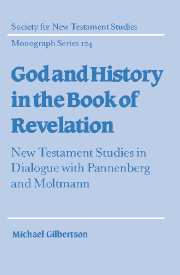 God and History in the Book of Revelation
God and History in the Book of Revelation Published online by Cambridge University Press: 22 September 2009
The aim of this study has been to examine the extent to which the reading of one New Testament text – the Book of Revelation – can be used to support or question the contemporary theologies of history proposed by Wolfhart Pannenberg and Jürgen Moltmann.
I began in chapter 1 by setting the contributions of Pannenberg and Moltmann in their context, comparing and contrasting their proposals with other influential ideas about the relationship between faith and history. In chapter 2 I proceeded to explore some of the methodological issues which arise from the consideration of the relationship between theology and scripture. I argued against attempts to see the relationship between exegesis and systematics as a ‘two-stage’ process, in which the results of biblical interpretation are first determined, then transmitted wholesale to an entirely separate discipline, which seeks to apply them to contemporary questions. Rather, I suggested that it was both legitimate and important for the two disciplines to interrelate. Similarly, I argued for the relationship between scripture and theological formulation to be seen as dialectical. Scripture is a starting point for the generation of conceptual frameworks in theology. These frameworks then need to be reassessed continually, to determine their adequacy as elaborations of scripture. At the same time, new light may be shed on scripture itself by reading it through the lenses provided by such conceptual frameworks.
To save this book to your Kindle, first ensure [email protected] is added to your Approved Personal Document E-mail List under your Personal Document Settings on the Manage Your Content and Devices page of your Amazon account. Then enter the ‘name’ part of your Kindle email address below. Find out more about saving to your Kindle.
Note you can select to save to either the @free.kindle.com or @kindle.com variations. ‘@free.kindle.com’ emails are free but can only be saved to your device when it is connected to wi-fi. ‘@kindle.com’ emails can be delivered even when you are not connected to wi-fi, but note that service fees apply.
Find out more about the Kindle Personal Document Service.
To save content items to your account, please confirm that you agree to abide by our usage policies. If this is the first time you use this feature, you will be asked to authorise Cambridge Core to connect with your account. Find out more about saving content to Dropbox.
To save content items to your account, please confirm that you agree to abide by our usage policies. If this is the first time you use this feature, you will be asked to authorise Cambridge Core to connect with your account. Find out more about saving content to Google Drive.